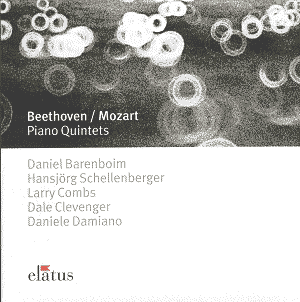Here is a coupling of two of the most delightful
works ever composed for wind instruments, though they occupy very
different places in their two composers’ careers. The Mozart Quintet
for Piano and Wind was composed in 1784, when he had reached full
maturity as a composer, and was poised to pour out the masterpieces
of the last seven years of his life. The Beethoven, on the other
hand, is a comparatively early work, written as a direct homage
to the Mozart work, which Beethoven heard on a trip to Prague
in 1796. Here we have Daniel Barenboim, in music to which he is
ideally suited, together with four of the principal wind players
from the Chicago Symphony Orchestra.
And an excellent ensemble they make, though I
could sometimes wish for a slightly more assertive approach from
the three reed players. Were they, perhaps, a little overawed
by Barenboim’s presence, and therefore less inclined to take the
expressive initiative than they might otherwise have been? Hansjörg
Schellenberger’s oboe playing, in particular, is far less engaging
than that of Neil Black on the outstanding Sony recording, with
Perahia at his wonderful best at the piano. On the other hand,
I did enjoy horn player Dale Clevenger’s willingness to sound
forth brassily at appropriate moments in both works.
These are lively characterful accounts; Barenboim
is probably better in the Beethoven than the Mozart, where he
sometimes fusses at the music, and introduces some slightly unwelcome
dynamic variations, risking drowning out some of the delightful
details in the wind writing. The Beethoven is, ultimately, not
at all on the same artistic level as the Mozart; but it does have
a genuinely fine slow movement, fit to rank with those in his
earlier piano concertos, and Barenboim and his colleagues make
a splendid job of it, with all the wind solos lovingly shaped.
The recording, made in Chicago’s Orchestra Hall,
is excellent, well balanced and intimate without being intrusively
close. A highly enjoyable issue then, though not one to displace
the Perahia or Kuerti on CBC.
Gwyn Parry-Jones
